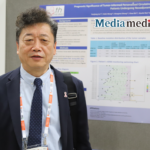
Editor’s Note: Among breast cancer subtypes, triple-negative breast cancer (TNBC) has long been a clinical challenge due to its high malignancy and poor prognosis. Traditional therapies for advanced TNBC often yield suboptimal results, but the rise of immunotherapy has brought new hope to patients.At the 47th San Antonio Breast Cancer Symposium (SABCS), the research team led by Dr. Tao Sun from Liaoning Cancer Hospital garnered significant attention (Abstract No. PS3-06) by proposing an innovative triple therapy combining penpulimab, anlotinib, and nab-paclitaxel (“target, immunotherapy, and chemotherapy”). Interim results from a median follow-up of 6.54 months were previously showcased at the ESMO conference, highlighting the potential of this regimen in treating advanced TNBC. At this year’s SABCS, results from a median follow-up of 8.67 months were presented, demonstrating notable advantages in objective response rate (ORR), disease control rate (DCR), and progression-free survival (PFS), alongside favorable patient tolerability. This innovative approach offers a new therapeutic option for TNBC patients and holds the potential to improve survival outcomes.
Oncology Frontier: Prof. Sun, what factors do you think contributed to the success of this study?
Dr. Tao Sun: I believe the success of this study lies in the selection of the treatment strategy—a triple combination of targeted therapy, immunotherapy, and chemotherapy working synergistically to combat cancer.
- Penpulimab: This PD-1 antibody blocks the interaction between PD-1 and PD-L1/2, preventing immune evasion by tumor cells.
- Nab-paclitaxel: Compared to conventional paclitaxel, nab-paclitaxel binds with albumin to enhance solubility and leverages the enhanced permeability and retention effect of tumors to achieve efficient tumor cell targeting. Studies have also shown that nab-paclitaxel can modulate immune activity, enhancing the immune response against tumors. Interestingly, while the IMpassion130 study combining nab-paclitaxel with immunotherapy showed a clear overall survival (OS) benefit, the IMpassion131 study using conventional paclitaxel yielded negative results. This underscores the importance of selecting the right chemotherapy agent for combination with immunotherapy.
- Anlotinib: This novel multi-target tyrosine kinase inhibitor (TKI) inhibits VEGFR, PDGFR, FGFR, and c-Kit, demonstrating both antiangiogenic and antitumor growth effects.
The results thus far indicate that the triple combination of penpulimab, anlotinib, and nab-paclitaxel demonstrates strong antitumor activity and safety in first-line treatment of TNBC. This provides new evidence for the application of immunotherapy in advanced TNBC.
Oncology Frontier: What are the next steps in your research?
Dr. Tao Sun: Previous studies have shown that the benefits of immunotherapy combined with chemotherapy are often limited to patients with PD-L1-positive tumors. One of our next objectives is to analyze how PD-L1-negative patients might also benefit from this triple combination.
Additionally, we aim to conduct exploratory analyses of genomic biomarkers to identify factors that predict efficacy. This could pave the way for more personalized and precise treatment options for advanced TNBC patients in China.
About Dr. Tao Sun
- Director of the Breast Oncology Department, Liaoning Cancer Hospital
- PhD Supervisor
- Recipient of the State Council Special Allowance
- Member of the Standing Committee, Breast Cancer Expert Committee, CSCO
- Vice Chair, Tumor Cardiology Expert Committee, CSCO
- Vice Chair, Tumor Heterogeneity and Individualized Treatment Committee, Chinese Anti-Cancer Association (CACA)
- Vice Chair, Tumor Biomarkers Committee, CACA
- Member, Targeted Therapy Expert Committee, CACA
- Member, Multiple and Unknown Primary Tumors Committee, CACA
- Vice Chair, Breast Diseases Professional Committee, Chinese Medical Education Association
- Vice Chair, Precision Medicine and Tumor MDT Professional Committee, Chinese Research Hospital Association
- Chair, Tumor Biomarkers Committee, Liaoning Anti-Cancer Association
- Chair-Elect, Chemotherapy Committee, Liaoning Anti-Cancer Association
- Chair, Antitumor Drug Committee, Liaoning Pharmaceutical Association
- Vice Chair, Clinical Evaluation of Pharmaceuticals Committee, Liaoning Pharmaceutical Society


